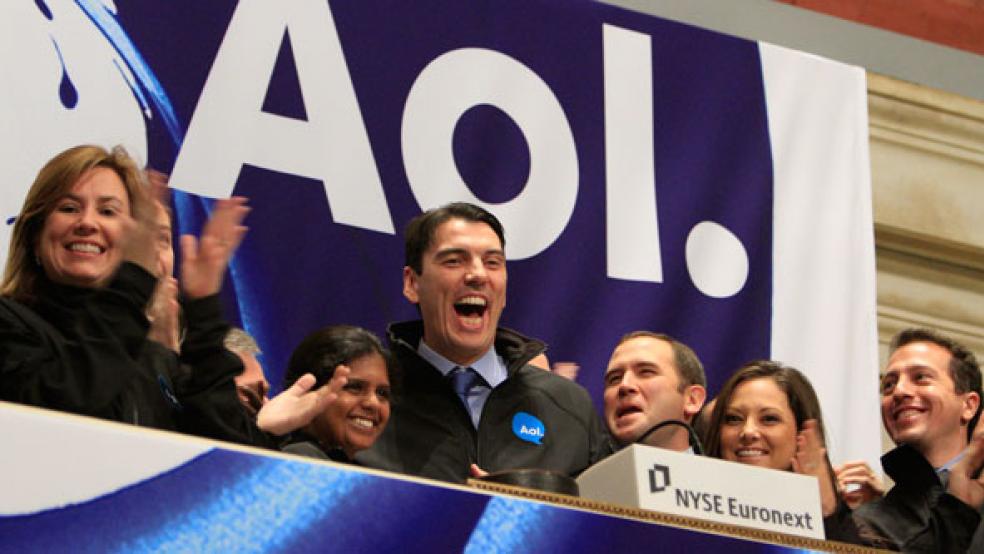The news that AOL (AOL) is selling a portfolio of some of its most valuable intellectual property – its patents – to Microsoft (MSFT) for nearly $1.1 billion unleashed a rally in its share price that left the tech/media company’s stock up an astonishing 43 percent yesterday.
Has the value of AOL’s business somehow nearly doubled overnight as a result of the transaction? Hardly.
What the deal does accomplish is provide an escape valve of sorts for some of the righteous fury being whipped up by an activist AOL shareholder, Starboard Value LP. The firm has targeted AOL’s portfolio of patents as an underutilized asset that isn’t generating value for shareholders, and cited that as evidence that the company’s board isn’t doing right by its investors. With one blow, the management of AOL has removed some of the grounds for Starboard’s ire – at least for now.
RELATED: Social Media Patent War Looms
The question is: What happens next? AOL has said it plans to return a sizeable chunk – perhaps half -- of the proceeds of the sale to its shareholders. While no further details were disclosed, $1.1 billion distributed among AOL’s investors in full would amount to some $12 a share, if the company chose to pay a special dividend. The online media company said when announcing the transaction that, had it taken effect at the end of 2011 – the last date for which balance sheet data has been disclosed – it would have had some $15 in cash on its books. So a large part of yesterday’s rally of nearly $8 a share to $26.40 likely simply reflects speculative trading and arbitrage in anticipation of some large but as yet unspecified payout to shareholders. Indeed, if details of such a payout turn out to represent more than AOL hinted, it wouldn’t be a surprise to see the stock’s price rise still further.
But unlocking value in the form of a sale of the company’s patents isn’t the same as unleashing runaway growth in revenues and earnings – and the latter feat is what AOL needs to accomplish in order to make Starboard Capital retreat for good from the fray. But that is going to be far harder to accomplish. The company wants to become a profitable player in the digital media universe (that’s the reason it bought the Huffington Post) but even as its earnings from its core Internet operations come under siege, the digital media bets have yet to begin pulling their weight.
So the patent sale is a victory – the intellectual property fetched more than most analysts had believed it was worth. But having $1 billion in cash generated from constantly rising revenues and profit margins would be far better than possessing $1 billion earned by selling off some of patents that would have continued to generate value for the company over the long haul. It’s a bit like selling off a mansion that has been in the family for generations in order to sustain the lifestyle of the latest family members.True, AOL isn’t in the dire straits that Eastman Kodak (EK) was before it filed for bankruptcy – when its only real value lay in its portfolio of patents – and it isn’t yet struggling like Research in Motion (RIMM), a big chunk of whose remaining value may lie in its own mobile-phone related patents. (RIM’s stock price also jumped yesterday, probably in reaction to the lavish price Microsoft was willing to pay for the AOL patent portfolio.)
But this is not a stock to buy – or perhaps even to own – at its current lavish valuation. There’s simply too much potential for AOL to disappoint investors, whether by not paying out enough of the Microsoft windfall in a special dividend or by devoting a chunk of it to acquiring another digital media business, when it has yet to prove that it can emerge as a leader in the online media field. Wait for real signs that a substantial business turnaround is underway to bet on AOL; anyone who decides to jump aboard the bandwagon at this stage is likely to end up as roadkill while the professional traders, speculators and arbitrageurs fight it out amongst themselves.
It might be a better idea to take a look around and try to identify the companies who stand to benefit from the apparent surge in value of patents – or those businesses, like Microsoft, that are able to fork over the big bucks to acquire them in what is shaping up to become a patents arms race.



